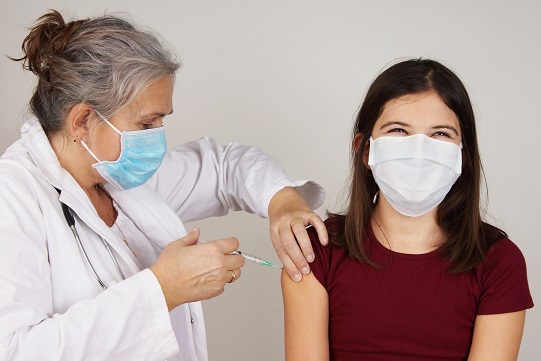Latest COVID-19 variant Omicron is highly infectious and still spreading. It is more important than ever we all get vaccinated to protect ourselves, our family and friends. Boosters increase our protection against the virus up to more than 88 per cent.
We talk to myth-busting medical experts who answer your most frequently asked questions about these essential jabs.

What protection does a booster jab give?
Dr Emeka Okorocha, who works in A&E in London and South East, said: “As a doctor, I have seen first-hand the effect COVID-19 can have on people. I want to remind everyone you can still get seriously ill with the virus, so it is so important to get the jab to keep ourselves, your friends and loved ones safe. COVID-19 is highly infectious. The vaccine remains our
best line of defence against it. Omicron is highly transmissible and still has the potential to lead to significant numbers of people in hospital, so it’s so important your immunity is topped up, and to come forward for your first or second dose if you haven’t already. We don’t know what threat any future variants may pose, so if you haven’t come forward for any jabs, it is absolutely essential you do so.”

‘ABSOLUTELY ESSENTIAL’: Dr Emeka Orkorocha
When can you have a booster jab?
Yorkshire-based Professor Mahendra G Patel OBE, Pharmacy and Inclusion and Diversity Lead, said: “You can get a COVID-19 booster three months after your second dose and 28 days after positive COVID test. It’s also not too late to get a first or second dose. Getting the vaccine has never been easier. Everybody aged 12 and over have now been offered two doses of a COVID-19 vaccine. If you are 12 years old or above on the day the vaccinations are taking place in school, you will be able to access a vaccine.
If you have not yet had a COVID-19 vaccine, it’s not too late. Appointments for first doses of COVID-19 vaccines are still available for anyone unvaccinated.”

PROFESSOR MAHENDRA G PATEL
Is it safe to have a booster jab if I’m pregnant?
London-based Dr Jenny Jardine from Royal College of Obstetricians and Gynaecologists, who is also seven months pregnant and has had her COVID-19 booster jab, said: “Both as a doctor and pregnant mother myself, we can now be very confident the COVID-19 vaccinations provide the best possible protection for you and your unborn child against this virus. I would strongly call on all pregnant women like me, if you haven’t had the vaccine yet, to either speak to your GP or midwife if you still have questions and then book right away today.”

‘VERY CONFIDENT’: Dr Jenny Jardine
Does a booster jab carry side effects?
Dr Okorocha said: “The COVID-19 vaccine is quick, easy and free. Don’t worry about the side effects. Like all medicines, the COVID-19 vaccines may cause some side effects, but most of these are mild and short-term, lasting no longer than a week, and not everyone gets them. Also, if you weren’t able to get your booster dose because you had COVID-19, remember to book your jab 28 days after you no longer have the virus.”
How easy is it to get a booster jab?
Bradford-based NHS Dr Amir Khan said: “We know many people are juggling busy lives, which is exactly why the NHS is making it as easy as possible for you to get your booster. New walkin vaccination sites have been set up across the country, and existing sites have extended their opening hours, so as many people as possible can get jabbed as soon as possible. And, once you’ve had your vaccine, then why not encourage your friends and family to book as well, so we all have the best protection possible.”

‘BEST PROTECTION POSSIBLE’: Dr Amir Khan
How effective is a booster jab?
Prof Patel said: “New analysis of vaccine efficacy by UKHSA has found protection against hospitalisation from vaccines is good against the Omicron variant. When the reduced risk of hospitalisation was combined with vaccine effectiveness against symptomatic disease, the vaccine effectiveness against hospitalisation was estimated as 88 per cent two weeks after a booster dose. One dose of any vaccine was associated with a 35 per cent reduced risk of hospitalisation among symptomatic cases with the Omicron variant, two doses with a 67 per cent reduction up to 24 weeks after the second dose and a 51 per cent reduced risk 25 or more weeks after the second dose.”
Your booster jab is vital
- Every adult needs to get a COVID-19 Booster vaccine, because two doses of the vaccine do not give enough protection against catching the Omicron variant.
- Check your eligibility and find out how to book at https://www.nhs.uk/covidvaccination if you are in England.
- If you are in Scotland visit: scot/covid-19-vaccine
- For Wales visit: wales/get-your-covid-19-vaccination
- For Northern Ireland visit: covid-19.hscni.net/get-vaccinated










